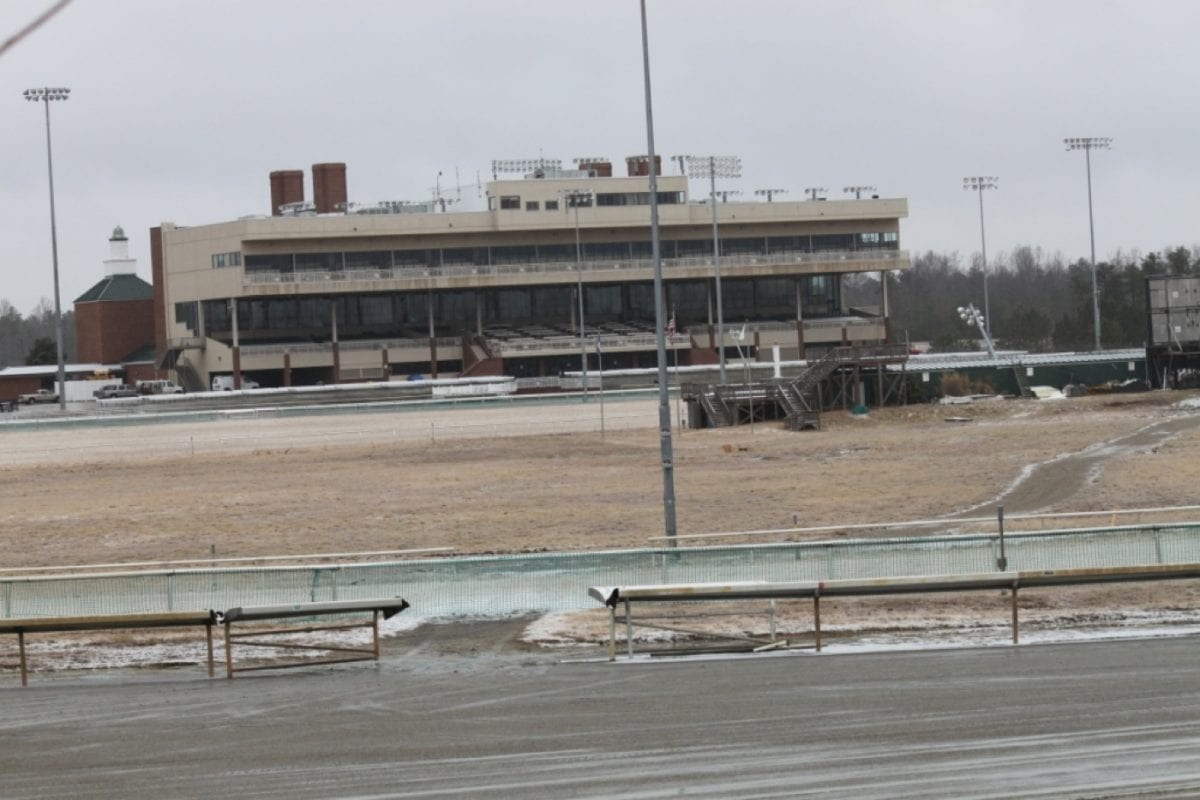Colonial Downs: Virginia House approves historical racing

Colonial Downs grandstand. Photo by Nick Hahn.
by Frank Vespe
Live racing is a big step closer to returning to Virginia’s Colonial Downs.
The Virginia House of Delegates on Tuesday voted overwhelmingly – 79-21 – in favor of HB 1609, a bill that would allow “historical horse racing” machines in the Commonwealth. Now the bill heads to the state Senate, which is expected to begin the process of considering it as early as next week.
Historical racing machines, which to users feel essentially like slot machines, use previously contested races to generate the winning numbers. They have been critical to the success enjoyed in recent years by tracks like Oaklawn Park and Kentucky Downs.
And, if HB 1609 becomes law, they could be critical to what advocates hope will be the rebirth of Colonial Downs in New Kent County, east of Richmond – perhaps hosting a live Thoroughbred meet as early as 2019.
“I think the nice thing about that vote and the size of the vote in favor was that people recognize that something significant has to be done to reopen Colonial Downs,” said Jeb Hannum, executive director of the Virginia Equine Alliance (VEA), the all-breed racing umbrella group. “I feel like we made our case, and now we move forward to the Senate.”
The bill would allow historical racing machines at a racetrack and also at any off-track wagering facilities owned by either the track or by the VEA, which currently has three OTBs in operation, with a fourth, in Collinsville, VA, slated to open in March.
Debbie Easter, president of the VEA and executive director of the Virginia Thoroughbred Association (VTA), which represents the state’s Thoroughbred breeders, said that estimates indicated that the passage of a historical racing machine bill would mean that the Thoroughbred industry would “possibly do $6 million to $10 million more than we could do ourselves” via off-track wagering facilities and advance deposit wagering.
“It’s more money for the entire industry, not just Thoroughbred racing,” she emphasized.
Colonial Downs, which opened in 1997, last conducted live Thoroughbred racing in 2013. Its 2014 season – and subsequent racing years – was scuttled by an acrimonious dispute between Virginia horsemen and Colonial’s owner, Jeff Jacobs.
A Chicago-based group called Revolutionary Racing now reportedly has an agreement to purchase Colonial Downs. But that group believes that Colonial is only financially viable if additional revenue, such as from historical racing, is added.
According to a study commissioned by Revolutionary, which envisions the revitalized Colonial’s operations fully ramped up by 2022, the company by then would host approximately 25 days of live racing at Colonial Downs and have a fully built-out network of 10 off-track wagering facilities.
The study, conducted by Chmura Economics and Analytics, projects that the company’s 2022 revenue will exceed $200 million, of which about 80 percent would come from historical racing. It further estimates that the company will employ more than 400 people.
Easter said that she believed the recent state House elections – which included the retirement of speaker William Howell (R-Stafford County), a longtime foe of expanded gaming, as well as a Democratic wave which came within a whisker of giving that party a majority in the House – played an important role in today’s vote.
She also thought that Revolutionary’s economic message was critical.
“I think also you’ve got the whole economic development thing about New Kent County, and you’ve got Colonial Downs sitting there shuttered, and the jobs that would be really important to the locality,” she pointed out.
And, she acknowledged, passage of historical racing and the rejuvenation of Colonial would be beneficial to the breeders and horsemen her group represents.
“I think it’s huge,” she said. “First off, we get some live racing back in Virginia. The other thing it’s going to let us do is shore up our incentive program (for breeding and raising horses in Virginia), so I think it’s helpful to make sure we can do those and hopefully expand them a little bit.
“It’s added money, so it’s a good thing.”








I’m a NC resident but nevertheless I’m excited for the sport of racing in Virginia!
Me also! Get live racing going again! Many of us from NC will strongly support a track at New Kent!
Many NC Thoroughbred breeders support VA racing and believe that colonial downs race track is an asset to us all. Great turf racing and great family fun.